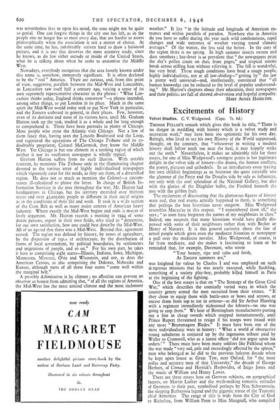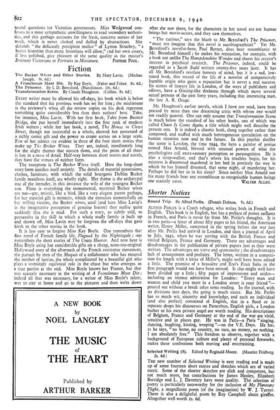Excitements of History
Velvet Studies. C. V. Wedgwood. (Cape. 7s. 6d.)
THOMAS FULLER'S remark which gives this book its title, "There is no danger in meddling with history which is a velvet study and recreation work," may have been too optimistic for his own day. Raleigh, who lived to see his own History of the World suppressed, thought, on the contrary, that "whosoever in writing a modern history shall follow truth too near the heel, it may happily strike out the teeth." Nevertheless, it makes an admirable title for these essays, for one of Miss Wedgwood's strongest points is her legitimate delight in the velvet side of history—the drama, the human conflicts, the poetry, pictures and cathedrals. In an intrcductory essay tracing her own childish beginnings as an historian she quite naturally sets the glamour of the Percy and the Douglas side by side as influences, not only with the cool splendour of the National Gallery, but also with the glories of the Diaghilev ballet, the Firebird beneath the tree with the golden fruit.
The excitement of discovering that the glamorous figures of history were real, that real events actually happened to them, is something that perhaps the best historians never outgrow. Miss Wedgwood resembles Macaulay in this respect. "I remembered them all," she says ; "as soon have forgotten the names of my neighbours in class." Indeed, one suspects that many historians would have gladly dis- pensed with some of their neighbours rather than with Becket or Henry of Navarre. It is this general curiosity about the fate of actual people which gives even the mediocre historian or newspaper a pull over the mediocre novelist. Miss Wedgwood, of course, is far from mediocre, and she makes it fascinating to learn or be reminded that, for example, Davenant, who wrote "Your beauty, ripe and calm and fresh, As Eastern summers are," was knighted for valour by Charles I and was employed on such drngerous missions that he was nearly executed, while Suckling, something of a society play-boy, probably killed himself in Paris at the beginning of the fighting. One of the best essays is that on "The Strategy of the Great Civil War," which describes the comically varied ways in which the country gentry armed the men recruited from their estates. "If they chose to equip them with battle-axes or bows and arrows, or encase them from top to toe in armour—as did Sir Arthur Hazelrig with a regiment immediately nicknamed the lobsters—no one was going to stop them." We hear of Birmingham manufacturers putting out a line in cheap swords which snapped instantaneously, until Prince Rupert threatened to resign if his troops were issued with any more "Brummagem Blades." It must have been one of the most individualistic wars in history: "What a world of obstructive young subalterns is conjured up by the ingenuous tribute paid by Waller to Cromwell, who as a junior officer 'did not argue upon his orders.'" There must have been many soldiers like Falkland whom the war made "very sad, pale and exceedingly affected by the spleen," men who belonged as he did to the previous halcyon decade when he kept open house at Great Tew, near Oxford, for "the most polite and accurate men of that University," the decade of George Herbert, of Comus and Herrick's Hesperides, of Inigo Jones and the music of William and Henry Lawes.
There are three essays here on German subjects, on geographical factors, on Martin Luther and the myth-making romantic attitudes of Germans to their past, symbolised perhaps by Neu Schwanstein, the sleeping Barbarossa legend and the gigantic statue of the Teutonic chief Armenius The range of title is wide from the City of God to Richelieu, from William Penn to Miss Mangnall, who compiled
Usetul questions for Victorian governesses. Miss Wedgwood con- fesses to a most sympathetic unwillingness to read secondary authori- ties, and this perhaps accounts for the fresh, concrete nature of her work, which is never choked and dulled by abstractions. She defends "the delicately percipient malice" of Lytton Strachey, "a better historian than many historians will allow," Pnd her own essays, if less polished, give pleasure of the same quality as the master's Eminent Victorians or Portraits in Miniature. PHOEBE POOL.



































 Previous page
Previous page